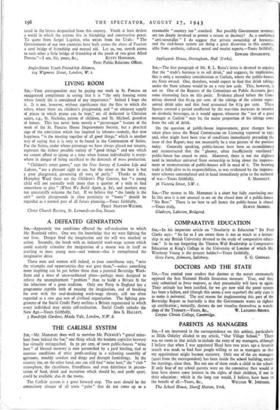Sm,—The first paragraph of Mr. R. L. Reiss's letter is
devoted to arguing that the " trade's business is to sell drink," and suggests, by implication, this is only a secondary consideration at Carlisle, where the public-houses are State owned. One, therefore, would expect to find that drink takings under the State scheme would be on a very low scale. This, however, is not so. One of the Reports of the Committee on Public Accounts gave some interesting facts on this point. Evidence placed before the Com- mittee showed that 81.z4 per cent. of the takings of the scheme repre- sented drink sales and that food accounted for 8.74 per cent. These figures covered a period unaffected by the war-time increases in taxation on alcoholic beverages, so it would appear, whatever the " test of a good manager at Carlisle " may be, the major proportion of his takings come from the sale of drink.
On. the question of public-house improvement, great changes have taken place since the Royal Commission on Licensing reported in 1931 and, what might have been true of conditions immediately preceding the issue of that Report, may not necessarily be a true picture of the position today. Generally speaking, public-houses have been so reconditioned and reconstructed that the " gloomy, often insufficiently ventilated " public-house has ceased to exist. Moreover, there is not the slightest need to introduce universal State ownership to bring about the improve- ment or reconstruction of -public-houses still in need of it. The brewing trade is fully alive to its responsibilities, as was evidenced by the improve- ment schemes contemplated and in hand immeffiarrly prior to the outbreak






















 Previous page
Previous page